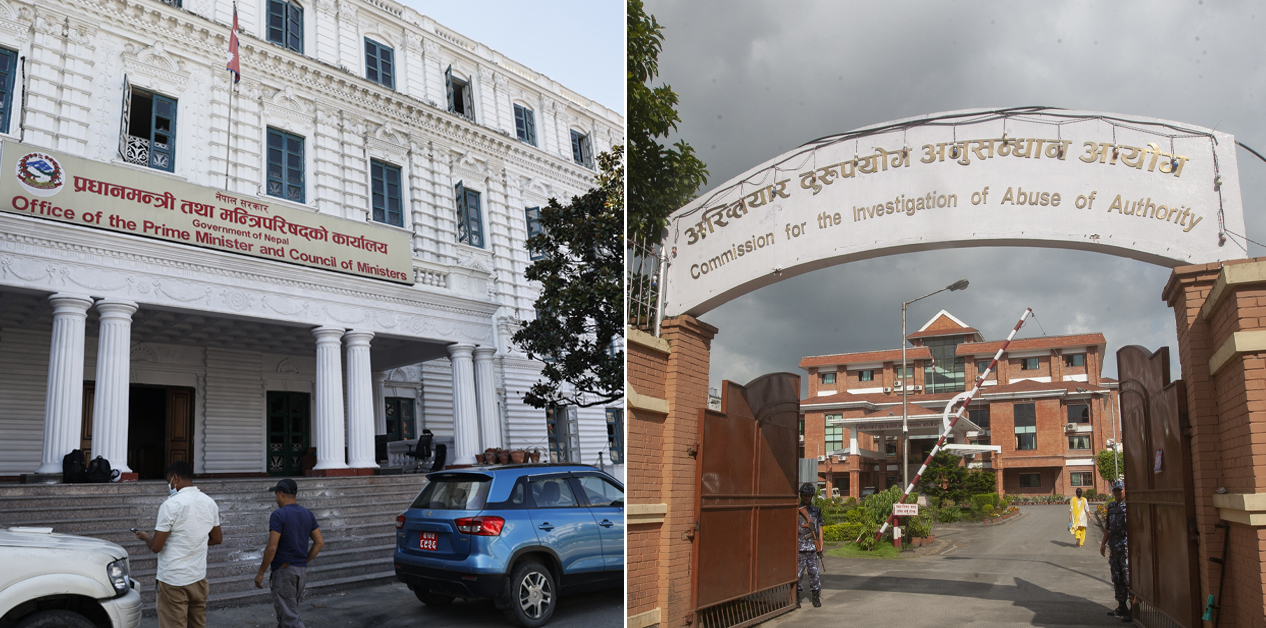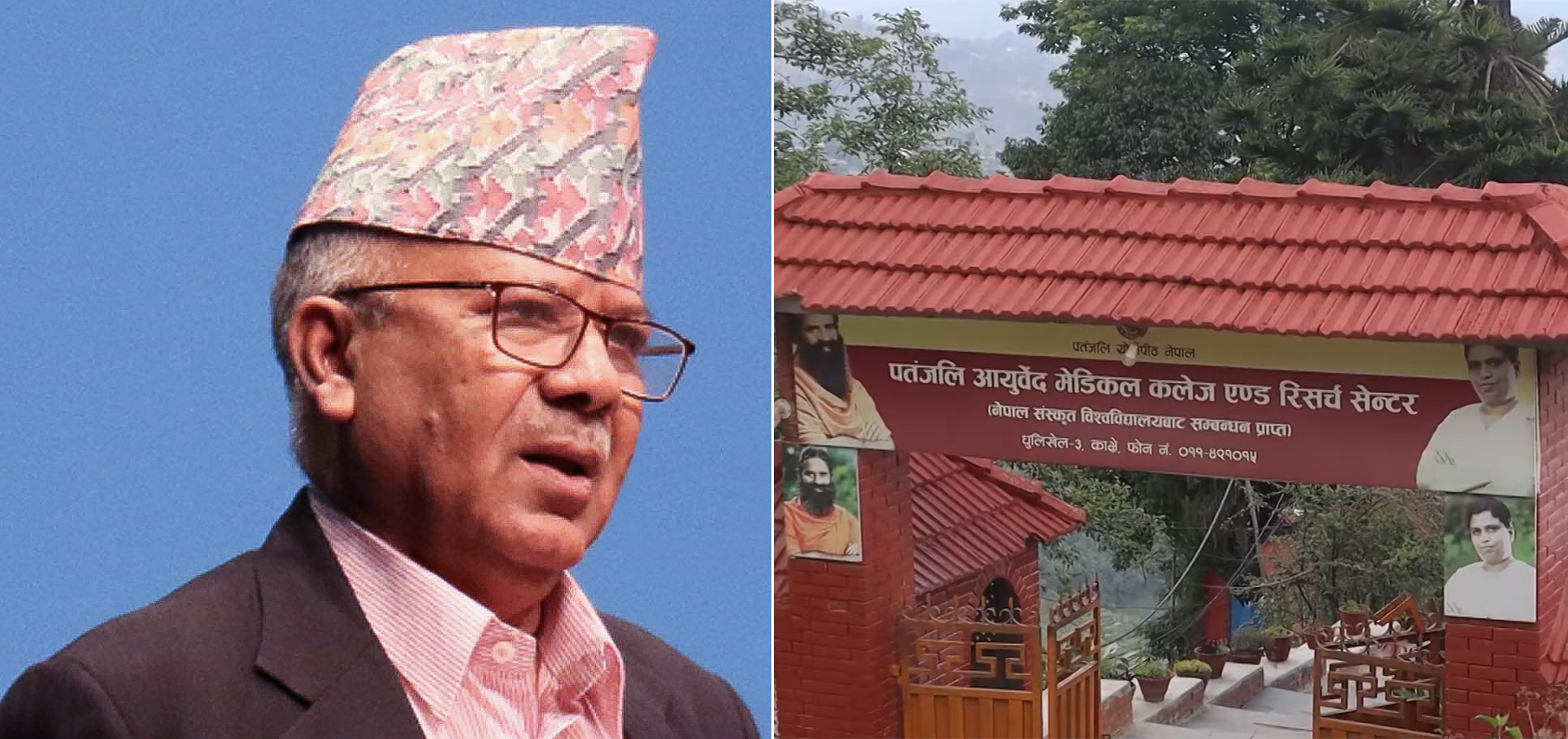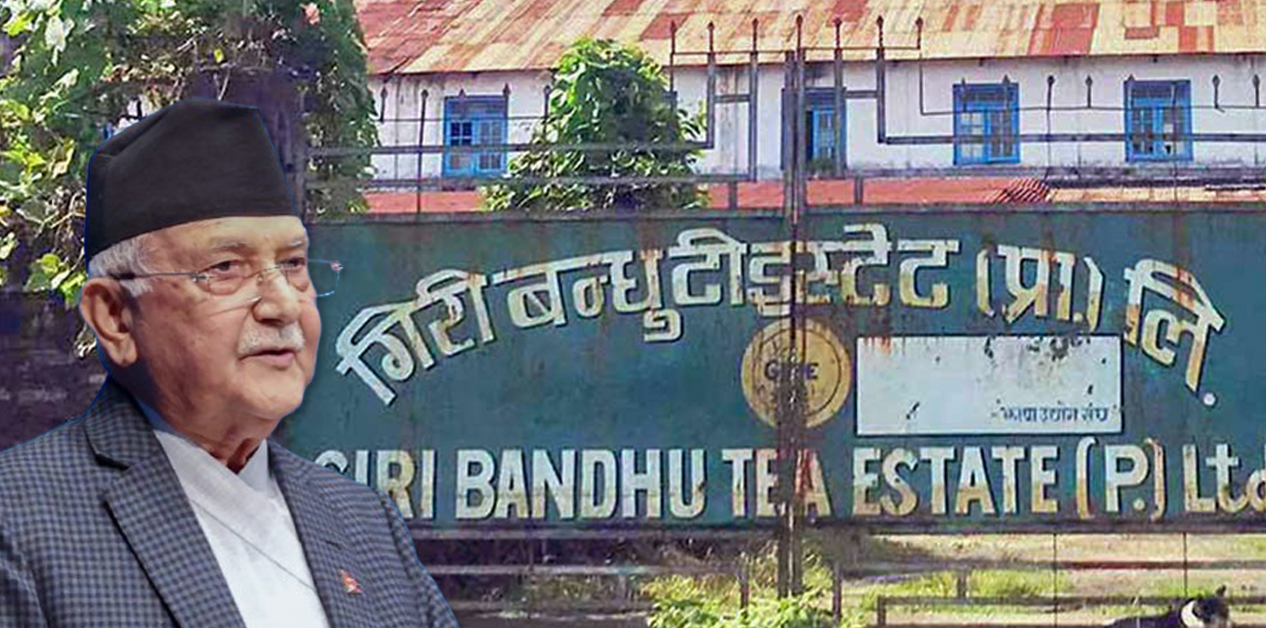
Amid growing calls for accountability, the Commission for the Investigation of Abuse of Authority (CIAA) faces increasing pressure to probe past Cabinet decisions, exposing policy-level loopholes and political impunity

KATHMANDU: On 6 August 2023, the Supreme Court dismissed the bail plea of the accused in the Lalita Niwas land embezzlement case in Baluwatar, which was linked to policy-level corruption, and directed that investigations be conducted against all those involved in the Cabinet’s decision.
The verdict, delivered by a bench comprising Justices Anil Kumar Sinha (currently Minister of Law) and Kumar Chudal, noted that corruption occurs in a pyramid-like manner and that all participants must be investigated. The bench also clarified that in heinous crimes such as corruption, it cannot be that some are investigated while others are not.
The Commission for the Investigation of Abuse of Authority (CIAA) had not filed cases against the then Prime Minister duo, Madhav Kumar Nepal and Baburam Bhattarai, arguing that policy-level decisions did not fall under its jurisdiction. However, their statements had been recorded. The Supreme Court’s decision effectively opened the door for the CIAA to investigate Nepal and Bhattarai.
Senior advocate Balkrishna Neupane had filed a writ on February 12, 2020, challenging the decision not to file cases against Nepal and Bhattarai; the case is still pending before the Supreme Court.
Similarly, on 25 November 2022, a writ was filed by advocate Raju Prasad Chapagain and others demanding that policy-level corruption be included within the CIAA’s jurisdiction. Since the issuance of a “show-cause” order on January 4, 2023, this case too remains under consideration.
The misuse of authority and corruption-related activities by public office holders are covered under Section 4 of the Commission for the Investigation of Abuse of Authority Act, 1991.
Investigating whether corruption has occurred and taking the matter to its conclusion falls within the commission’s jurisdiction. However, subsection (b) of the same section bars the commission from investigating or taking action regarding any policy-level decision made collectively by the Cabinet or any of its committees. The CIAA had cited this provision to exempt the two former prime ministers from investigation.

Madhav Kumar Nepal and Patanjali Ayurveda Medical College
Meanwhile, former Prime Minister Nepal faced a separate corruption case concerning the sale of land exceeding the limits of Patanjali Yogpeeth and Ayurvedic Company.
The case named 93 individuals as defendants, including then-Ministers Prem Bahadur Singh and Dambar Shrestha (deceased), Chief Secretary Madhav Prasad Ghimire (deceased), and Secretary Chhabiraj Panta. On June 5, 2025, the CIAA filed the case against Nepal and others at the Special Court. On June 25, 2025, Nepal was released on a bail of Rs 3.5 million.
Former Supreme Court Justice Ishwar Prasad Khatiwada has stated that it would be contrary to the rule of law if cases are not filed and no action is taken against corruption committed through policy loopholes by those in office.
According to him, granting immunity for policy-level decisions also undermines the principle of equality. “Even the Chief Justice or any judge must face the consequences if they commit a criminal offense, whether the person is the President, Prime Minister, or any other officeholder. Treating one class differently is a remnant of monarchy,” Khatiwada said.
The writ petitioners, including advocate Chapagain, have argued that the provision which shields Cabinet or its committee decisions under the guise of “policy-level” from the CIAA’s jurisdiction is arbitrary.
They maintain that this legal loophole has allowed responsible officials involved in corruption at high political levels to enjoy impunity. The writ notes that this arrangement does not align with the basic concept of the CIAA. It is neither judicial, transparent, nor reasonable to restrict the commission’s inherent authority to independently investigate and examine whether abuse of authority has occurred. The petitioners also contend that this provision violates the constitutionally mandated limits of legislative power.
Recently, political leaders and high-ranking government officials have been obtaining immunity from investigation and punishment based on policy-level decisions. In some cases, the practice of issuing Cabinet decisions specifically to avoid scrutiny has become common.
One example is the Giribandhu Tea Estate case in Jhapa. On April 26, 2021, the Cabinet had decided to allow the exchange of 343 Bighas of land within Province-1 (now Koshi Province) and even enacted a law to facilitate it. However, the matter reached the Supreme Court, which annulled the decision on February 7, 2024. This decision had been made during KP Sharma Oli’s tenure as Prime Minister.
In October 2013, a complaint was filed with the CIAA alleging corruption in the management and sustenance of former Maoist combatants. The Commission corresponded with the Ministry of Peace and Reconstruction and other relevant parties.

KP Sharma Oli and Giribandhu Tea Estate
The Ministry responded that the funds had been disbursed based on Cabinet decisions, classifying it as a policy-level decision. Following this, the CIAA put the case on hold. Over six years, Rs 9.79 billion had been spent for the management and sustenance of the combatants.
Another example exists. On December 9, 2019, the government decided to lease out Gokarna Forest Resort under Nepal Trust—including nearly 3,000 Ropani of land—to Yeti Holdings Pvt. Ltd. for 25 years starting from 2025, despite about six years remaining on the original contract.
The decision was taken in an opaque manner. Organizations including Transparency International questioned the government’s decision. The matter reached not only the Parliamentary Public Accounts Committee but also the CIAA. However, since it was a Cabinet decision, the CIAA put the complaint on hold.
Former Chairman of Transparency International and senior advocate Shreehari Aryal has stated that the CIAA should courageously prosecute corruption disguised as policy-level decisions. He said, “If the CIAA prosecutes acts carried out in a bad-faith, dishonest manner under the guise of ‘policy’, the Supreme Court can then interpret it properly.”
The CIAA’s own 2018 report, “Study on Corruption and Good Governance in Nepal,” noted that policy-level decisions are the area where the highest proportion of corruption occurs.
According to the report, 30.4 percent of corruption is linked to policy-level decisions. Among higher-level corruption, political parties are responsible for 23.1 percent, followed by secretaries and departmental chiefs at 15.1 percent, ministerial advisors at 14.4 percent, the Prime Minister and Cabinet at 13.2 percent, and Chief Secretary and subordinates at 7 percent.
The CIAA also noted that the lack of a clear definition of policy-level decisions has led to the institutionalization of such corruption.
The CIAA has consistently raised this issue in its annual reports. On September 21, 2025, the Commission submitted its 35th annual report to President Ramchandra Paudel. Although the full text was not publicly released, a press note highlighted that the CIAA could not fully implement a proactive investigation system in areas with high corruption risk.
Former Chairman of Transparency International and senior advocate Shreehari Aryal has stated that the CIAA should courageously prosecute corruption disguised as policy-level decisions. He said, “If the CIAA prosecutes acts carried out in a bad-faith, dishonest manner under the guise of ‘policy’, the Supreme Court can then interpret it properly.”
Similarly, in its 34th annual report, the CIAA recommended stopping policy-level corruption and ensuring that routine administrative work at federal, provincial, and local levels should be decided within the respective authorities rather than being escalated to the Cabinet.
The report stated: “Decisions that should legally be taken at the ministry, department, or secretariat level should immediately cease to be taken by the Cabinet, provincial cabinet, or local assemblies, and the law should ensure that decisions are made by the designated authority or office.”
The CIAA has also demanded the right to review decisions classified as policy-level. CIAA Chief Commissioner Prem Kumar Rai, on October 10, 2024, urged the Parliamentary State Affairs and Good Governance Committee (now dissolved) to clearly define the scope of policy-level decisions made by the Cabinet.
“Questions about what constitutes a ‘policy-level decision’ have always remained unanswered. Our understanding so far is that every decision made by the Cabinet, or by the provincial cabinets, is considered a policy-level decision,” Rai said. “Policy-level decisions should apply universally, be consistent for everyone, and be shared. They should not serve individual interests.”
According to former Secretary Bimal Wagle, the secret performance manual specifies which matters are to be taken to the Cabinet. He believes that any matter outside the Cabinet’s jurisdiction should be returned rather than decided upon.
He said, “If the law clearly defines what constitutes a policy-level decision, then arbitrary matters would not have needed to be taken to the Cabinet. Not all matters would reach the Cabinet, and not every matter that does reach would result in a decision.”
The CIAA has also demanded the right to review decisions classified as policy-level. CIAA Chief Commissioner Prem Kumar Rai, on October 10, 2024, urged the Parliamentary State Affairs and Good Governance Committee (now dissolved) to clearly define the scope of policy-level decisions made by the Cabinet.
In order to bring Cabinet decisions under the CIAA’s investigative scope, the Commission for the Investigation of Abuse of Authority (Third Amendment) Bill was passed by the National Assembly on January 19, 2020, and sent to the House of Representatives’ State Affairs and Good Governance Committee.
However, following the dissolution of the House on 13 September 2025, the bill became inactive. The bill defined policy-level decisions as follows:
(a) Decisions that, except as provided by existing law, disadvantage the public or provide benefit exclusively to a particular person or private institution, contrary to publicly announced policy;
(b) Decisions related to public procurement, except those conducted under prevailing law;
(c) Decisions on matters that should be decided by other bodies or officials under prevailing law but are decided beyond their jurisdiction.
The bill also stated that matters meeting these criteria would not be considered policy-level decisions and would fall within the CIAA’s jurisdiction for investigation and action.
In the current political context, there is intense pressure on the CIAA to investigate past Cabinet decisions. For instance, former Prime Minister Nepal had already faced a case because the decision had been taken by the Cabinet. He remains one of the highest-ranking politicians to have been subjected to action for corruption since 1990.